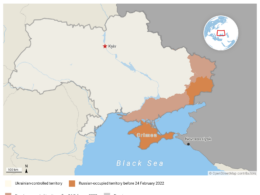Ukraine is evaluating whether to replace the US dollar with the euro as the reference currency for the hryvnia, central bank Governor Andriy Pyshnyi told Reuters in an interview published on 8 May 2025.
Pyshnyi said the review was prompted by growing integration with Europe, volatility in global markets, and a weakening role of the dollar in the context of international fragmentation.
Potential accession to the European Union, a "strengthening of the EU's role in ensuring our defense capabilities, greater volatility in global markets, and the probability of global-trade fragmentation” are key reasons driving the reassessment, Pyshnyi said.
Shifting global dynamics
The dollar remains dominant in global trade and reserves, with countries like Saudi Arabia and Hong Kong pegging their currencies to it. But US President Donald Trump’s record-high tariffs imposed on most countries have raised doubts among some about its reserve currency future, according to Reuters.
Since Trump returned to the White House in January, the dollar has declined by over 9% against a basket of leading currencies, as investors increasingly pull back from US assets. Despite this, experts caution against assuming the dollar’s weakness will impact its reserve role, Reuters says.
Moldova, which began EU accession talks alongside Ukraine, officially shifted the reference currency for the Moldovan leu from the dollar to the euro on 2 January 2025.
Ukraine remains heavily dependent on foreign financing amid its ongoing defense against Russia’s invasion. Pyshnyi said the country expects $55 billion in external financing in 2025, which will cover its budget deficit and help build financial reserves for future years. Forecasts project $17 billion in 2026 and $15 billion in 2027, according to him.
Ukraine’s economy could grow by 3.7–3.9% over the next two years, driven by European integration, investment, and stabilization, according to Pyshnyi. He warned that outcomes hinge on the war, and even under favorable conditions, recovery would be gradual.
, Andriy Pyshnyi, hryvnia, euro reference currency, US dollar, Central Bank of Ukraine, European Union accession, Moldova, FX market, Trump tariffs, Ukraine war economy, external financing, de-dollarization, managed exchange rate, Ukraine–EU relations



